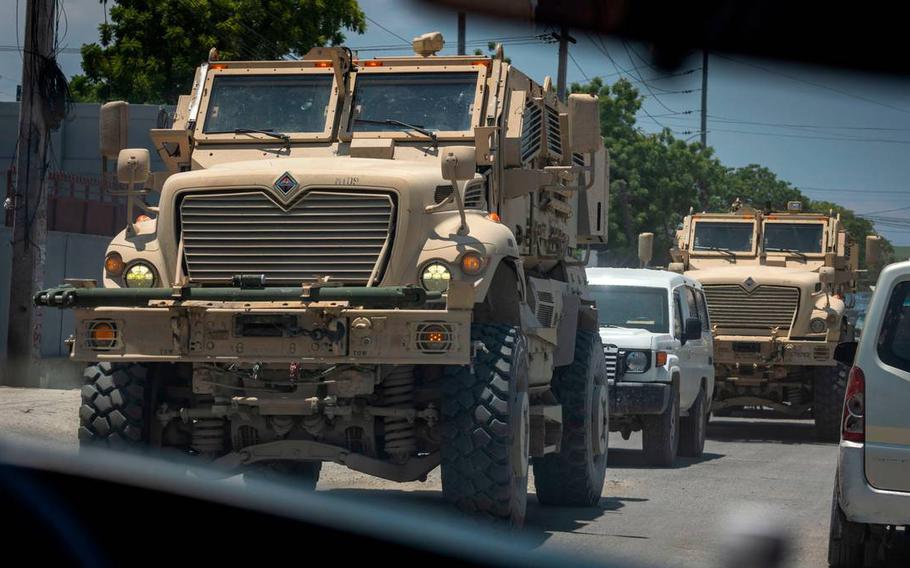Africa
UN Security Council unanimously extends Kenya-led security mission in Haiti for a year
Miami Herald September 30, 2024

Armored vehicles used by Kenyan police rumble through the streets of Port-au-Prince, Haiti. The vehicles are part of the United States more than $300 million in contributions to the U.N.-backed Multinational Security Support mission. (Jose Iglesias)
(Tribune News Service) — The United Nations Security Council voted unanimously Monday to extend for another year the mandate of the armed security mission helping Haiti fight armed gangs.
The 15-0 vote guarantees the presence of the Kenya-led Multinational Security Support mission in Haiti until October 2, 2025. But it doesn’t address a fundamental problem of the struggling effort: money.
Washington is so far the largest contributor to the mission, providing over $300 million that has gone toward the construction of a base of operations near the Port-au-Prince airport, armored vehicles, communications equipment and other assistance. A U.N. trust fund set up for contributions had $85.3 million in pledges last week — far less than the estimated $600 million a year Kenya has said is required.
Linda Thomas-Greenfield, the U.S. ambassador to the U.N., said the renewed mandate would “put the country on the path to peace and prosperity” and “sends a strong message to the people of Haiti: The world is standing with you.”
But she acknowledged the mission faces funding challenges. “Additional financial contributions are urgently needed to support this mission in the near-term, and we strongly urge other donors to consider making contributions,” she said.
The funding shortfall has led to a slow deployment of the 2,500 security personnel the mission is expected to have, and affected the effectiveness of the ill-equipped force in a country where armed gangs control all of major roads out of the capital and have recently begun attacks at sea.
To address the money issues, the U.S. had pushed to have the operation transition into a formal U.N. peacekeeping mission, which would guarantee U.N. funding. But during negotiations ahead of Monday’s vote both China and Russia opposed the move.
China’s envoy to the U.N. told the council Monday that Beijing opposed transforming the operation into a peacekeeping mission, saying discussion of other options would “only interfere with the implementation of the mission’s mandate.”
“The U.N. has sent multiple peacekeeping operations in Haiti, but the results have never been satisfactory, and the lessons learned have been extremely profound,” the Chinese diplomat said.
Still, Beijing encouraged other countries to help pay for the existing mission.
“We note that the mission still has a rather big gap in funding, and that a large portion of the pledged funds has not yet been realized,” the envoy added. “China calls on the relevant contributing countries to fulfill their commitments as soon as possible and to provide the mission with stable financial resources.”
A Russian diplomat told the council that Moscow opposes any new structure for the mission, saying that military assistance alone would not fix the country’s problems and pointedly noting the “American weapons that have flooded into Haiti.”
The current mission to Haiti, the Russian envoy said, has only been on the ground for three months and needs more time to expand. “Until this happens we believe it is premature to plan any transformations in the international presence, or any changes.”
Senior Biden administration officials on Monday said their decision to drop mention of transforming the mission into a peacekeeping operation in the draft resolution was due to Haitian Transitional Presidential Council leader Edgard Leblanc Fil’s “strong call” last week for a peacekeeping mission.
That call “now serves as as the hook that the Security Council and the UN can use to start the process to seek this transformation into a peacekeeping operation,” an official said. “This is typically how it has worked in the past with peacekeeping operations; the host country issues the call, constituting host country consent, and the Security Council works from there.”
The U.S. will now work with Haiti to begin the more formalized process of seeking a peacekeeping operation, the official said.
“We look to what the host country wants, what the citizens of that country need. And in this case, both are very clear, that host country has made an explicit call for a peacekeeping operation,” a senior administration official said.
©2024 Miami Herald.
Visit miamiherald.com.
Distributed by Tribune Content Agency, LLC.